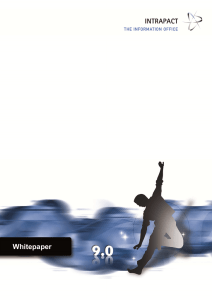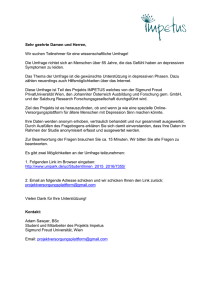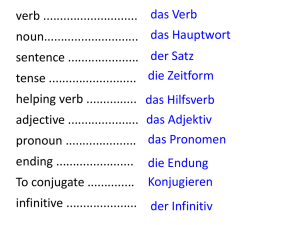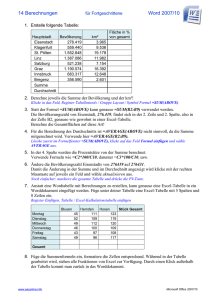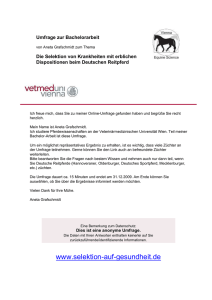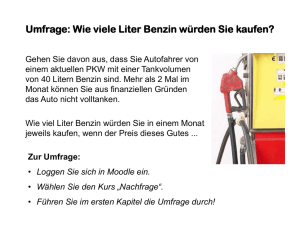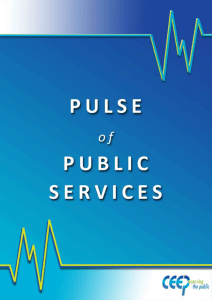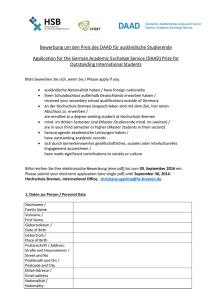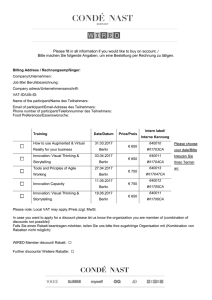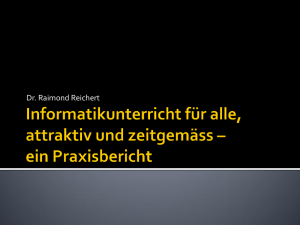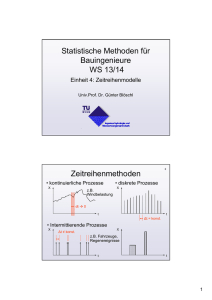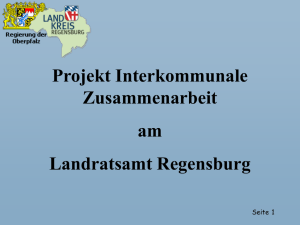Auswertung der online Umfrage der Masterarbeit in Digital Media an
Werbung
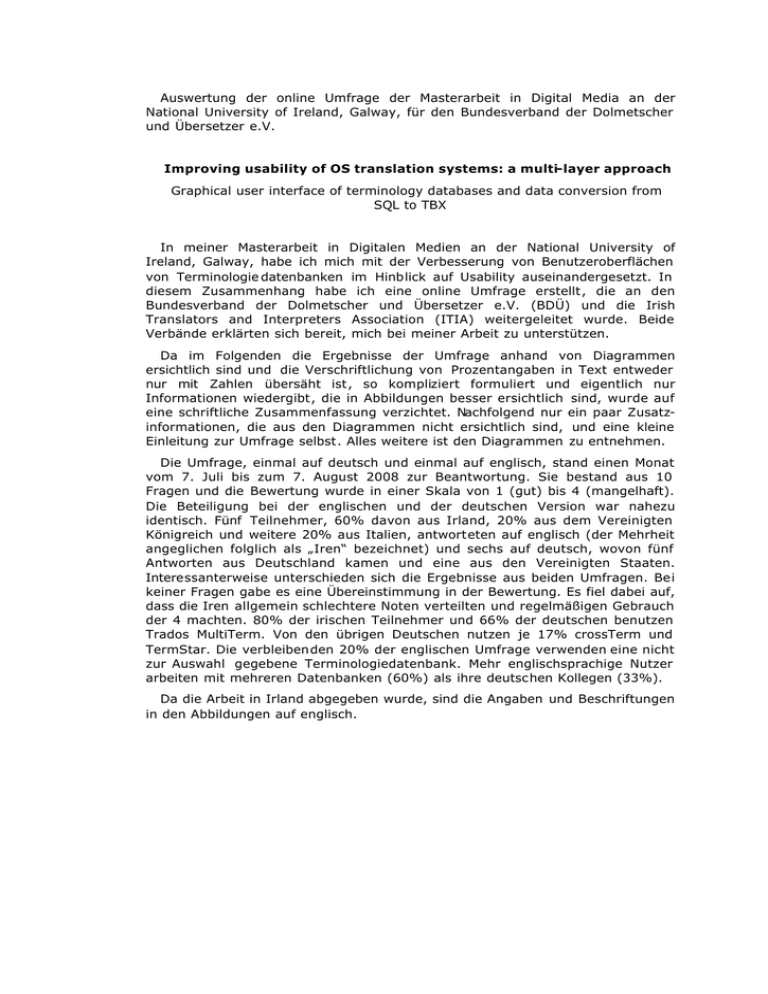
Auswertung der online Umfrage der Masterarbeit in Digital Media an der National University of Ireland, Galway, für den Bundesverband der Dolmetscher und Übersetzer e.V. Improving usability of OS translation systems: a multi-layer approach Graphical user interface of terminology databases and data conversion from SQL to TBX In meiner Masterarbeit in Digitalen Medien an der National University of Ireland, Galway, habe ich mich mit der Verbesserung von Benutzeroberflächen von Terminologie datenbanken im Hinblick auf Usability auseinandergesetzt. In diesem Zusammenhang habe ich eine online Umfrage erstellt, die an den Bundesverband der Dolmetscher und Übersetzer e.V. (BDÜ) und die Irish Translators and Interpreters Association (ITIA) weitergeleitet wurde. Beide Verbände erklärten sich bereit, mich bei meiner Arbeit zu unterstützen. Da im Folgenden die Ergebnisse der Umfrage anhand von Diagrammen ersichtlich sind und die Verschriftlichung von Prozentangaben in Text entweder nur mit Zahlen übersäht ist, so kompliziert formuliert und eigentlich nur Informationen wiedergibt, die in Abbildungen besser ersichtlich sind, wurde auf eine schriftliche Zusammenfassung verzichtet. Nachfolgend nur ein paar Zusatzinformationen, die aus den Diagrammen nicht ersichtlich sind, und eine kleine Einleitung zur Umfrage selbst. Alles weitere ist den Diagrammen zu entnehmen. Die Umfrage, einmal auf deutsch und einmal auf englisch, stand einen Monat vom 7. Juli bis zum 7. August 2008 zur Beantwortung. Sie bestand aus 10 Fragen und die Bewertung wurde in einer Skala von 1 (gut) bis 4 (mangelhaft). Die Beteiligung bei der englischen und der deutschen Version war nahezu identisch. Fünf Teilnehmer, 60% davon aus Irland, 20% aus dem Vereinigten Königreich und weitere 20% aus Italien, antworteten auf englisch (der Mehrheit angeglichen folglich als „Iren“ bezeichnet) und sechs auf deutsch, wovon fünf Antworten aus Deutschland kamen und eine aus den Vereinigten Staaten. Interessanterweise unterschieden sich die Ergebnisse aus beiden Umfragen. Bei keiner Fragen gabe es eine Übereinstimmung in der Bewertung. Es fiel dabei auf, dass die Iren allgemein schlechtere Noten verteilten und regelmäßigen Gebrauch der 4 machten. 80% der irischen Teilnehmer und 66% der deutschen benutzen Trados MultiTerm. Von den übrigen Deutschen nutzen je 17% crossTerm und TermStar. Die verbleibenden 20% der englischen Umfrage verwenden eine nicht zur Auswahl gegebene Terminologiedatenbank. Mehr englischsprachige Nutzer arbeiten mit mehreren Datenbanken (60%) als ihre deutschen Kollegen (33%). Da die Arbeit in Irland abgegeben wurde, sind die Angaben und Beschriftungen in den Abbildungen auf englisch. Online survey results Answers from Q.1 What terminology database are you using? Q.2 Do you use more than one terminology database? Q.3 Please rate your overall satisfaction with the interface’s simplicity and clarity (where 1 means good and 4 means poor). average: 2.09 Q.4 Please rate your overall satisfaction with the (where 1 means good and 4 means poor) - overall product - visual design of the interface average: 2.27 - simplicity and clarity of the structure average: 2.09 - navigation average: 2.09 average: 2.27 Q.5 Please rate the readability of the terminology database (where 1 means good and 4 means poor). average: 1.82 Q.6 Please shortly explain your rating of the readability. • There seems to be a problem with the latest version that sometimes causes problems with the rendering of foreign characters, thus hindering readability. (SDL MultiTerm) • It’s intuitive and user-centered (other) • If this refers to the readability of the entries within the user interface: the size of the display can be configured individually (MultiTerm 5.5) Q.6 Please shortly explain your rating of the readability. (ctd.) • Clearly structured, additional information one is searching for are found at first glance (Transit TermStar) • Entered terms are easily selected through the alphabetic register on the left and on the right there is a clear display of the terms in source and target language with all entered notes and characteristics; it is possible to edit entries from the same interface template (across crossTerm) Q.7 Please rate your satisfaction with the navigation procedures within the database (where 1 means good and 4 means poor). - general (graphics, icons, buttons, links) - speed average: 1.91 - clarity average: 2.0 - other average: 2.0 average: 2.27 Q.8 As someone working with terminology databases, do you typically prefer icons or word navigation? Q.9 Why do you prefer icon or word navigation? • Once you know their meaning, they’re faster (icons) • Words are my business • I prefer icons if they are big enough because they are easier to locate • Because I do not hate to remember what the icon means (prefers words) • The meaning of symbols, if they are not Windows standard symbols, are quickly forgotten, if the program is not used regularly. • Icons where labels are show if the mouse hovers over them. Good icons are unambiguous and there is no danger that after the localisation they could be interpreted ambiguously or unclearly. • Often too many icons are used and the images on them are not self-explanatory enough, so that tool-tips have to be read again and again to know what the icon stands for. Furthermore, the few functions which are vital for a t-database can be represented using words. Q.10 Are there any other issues you wish to mention? • It seems that some functions have no accompanying icons (e.g. the fix document function). It would be helpful to have an icon for all function. (SDL MultiTerm) • Clean-up issues to remove dual/ incorrect, entries exporting and importing databases to others (SDL MultiTerm) • Transit icons are often too small and can not always be memorized • The background colours are very pleasant while working; the small icons in the context field/in the register card help navigating and are generally well chosen (across crossTerm) • I still use MultiTerm 5.5, which has a very Spartan, but with reservations satisfactory interface. It is more important that serach functions are ok and well programmed and that the database is network compatible (which is not the case with newer MultiTerm Versions). Inzwischen ist die mündliche Prüfung überstanden, die Noten wurden verkündet und dank Ihrer Unterstützung darf ich mich als MA in Digital Media bezeichnen. Vielen herzlichen Dank! Christin Bartholmai
